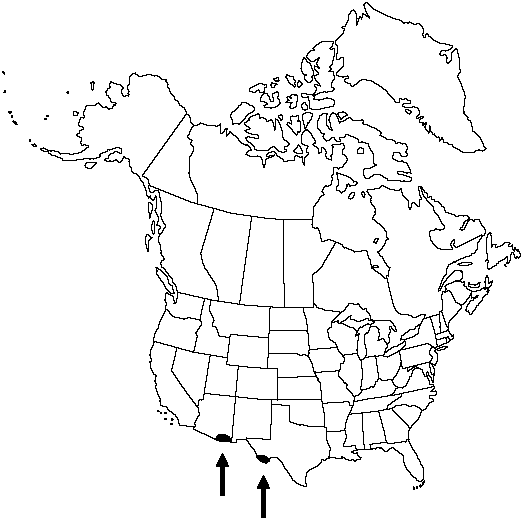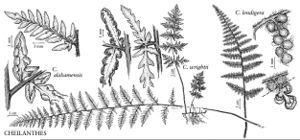Cheilanthes lendigera
Syn. Fil. 328. 1806.
Stems long-creeping, 1–3 mm diam.; scales uniformly brown or with poorly defined, dark, central stripe, linear-lanceolate, straight to slightly contorted, loosely appressed, usually persistent. Leaves scattered to clustered, 5–30 cm; vernation noncircinate. Petiole usually dark-brown, rounded adaxially. Blade ovate-deltate to oblong-lanceolate, usually 4-pinnate at base, 1.5–8 cm wide; rachis rounded adaxially, with scattered linear scales and dense monomorphic pubescence. Pinnae not articulate, dark color of stalk continuing into pinna base, basal pair not conspicuously larger than adjacent pair, usually equilateral, appearing glabrous or sparsely pubescent adaxially. Costae green adaxially for most of length; abaxial scales uniseriate and hairlike. Ultimate segments round to slightly oblong, beadlike, the largest 1–3 mm, abaxially sparsely to moderately pubescent with coarse hairs, adaxially glabrous. False indusia inframarginal, strongly differentiated, 0.25–0.5 mm wide, forming pouch with constricted aperture on abaxial surface of ultimate segments. Sori ± continuous around segment margins. 2n = 120.
Habitat: Rocky slopes and ledges, usually on igneous substrates
Elevation: 1300–2400 m
Distribution

Ariz., Tex., Mexico, Central America, South America.
Discussion
Cheilanthes lendigera has the small, beadlike ultimate segments characteristic of subgenus Physapteris; the prominent inframarginal false indusia and near absence of multiseriate costal scales serve to distinguish it from all other North American members of that group. T. Reeves (1979) suggested that C. lendigera is a fertile allotetraploid resulting from hybridization between the Mexican species Cheilanthes mexicana Davenport and C. marsupianthes (Fée) T. Reeves ex Windham (unpublished).
Selected References
None.
